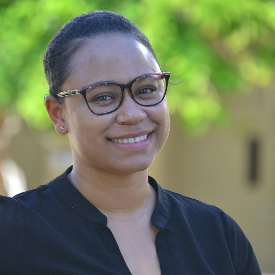
Larysha Green (MPP 2019)
Program Evaluation Assistant, Riverside Community Health Foundation
Why did you choose UCR’s MPP program?
I selected UC Riverside’s MPP program because I grew up in the Inland Empire. I knew that after graduating, I wanted to dedicate my career to working for and serving the Inland Empire community. Initially, I was nervous about committing to a newer MPP program, but I quickly stumbled into research, employment, fellowships, and teaching opportunities with multiple departments across UCR’s campus. UCR has a significant amount of resources and opportunities for professional growth.
What did you enjoy about your time in the program?
UCR’s public policy program is unique in many ways, but the geospatial classes and projects were most enjoyable (also most challenging). UCR has a Center for Geospatial Sciences, founded by two UCR public policy professors, and those professors teach the GIS classes. They taught me how to visualize, analyze, and interpret geographic data and make policy recommendations based on spatial statistics. Until applying for jobs after graduation, I was unaware of how valuable and marketable GIS skills are in today’s job market.
What skills did you learn and/or take away from the program that you apply to your job?
When I originally applied, I worked in housing/homelessness policy on a project funded by the LA County of Public Health. So naturally, I chose the health policy specialization because I was primarily interested in policies affecting the social determinants of health. Most professors allowed MPP students to select their research topics for projects, and most (if not all) of my projects were health policy focused. I eventually interned for Riverside Community Health Foundation, and I was offered a job right after graduation! As a program evaluation assistant, I utilize almost every core class from the program, but mainly:
- Policy Evaluation
- Quantitative Methods for Public Policy Analysis
- Geographic Information Systems (GIS) for Public Policy
- State Governments as Laboratories of Change
I highlight these courses because I found that the ability to conduct quantitative research and interpret research in terms of government policies and programs are highly desirable skills for analyst jobs in nonprofit and government.
Any advice for students applying to and/or currently enrolled in our program?
Students applying to the program and students enrolled should begin thinking about their capstone project as early as possible—team up with students who have similar interests but different strengths. For example, my capstone partner was highly skilled in writing, while academic writing is not necessarily my best strength. I would also encourage prospective students to network, network, network. They should discuss their career interests with MPP staff, professors, alumni and use LinkedIn to network with people who already have their “dream job.” Do not be afraid to ask for teaching assistant opportunities, research opportunities, or apply for student jobs. As a graduate researcher, I worked for MPP professors; then, I worked for the UCR Human Resources Health and Wellness Department. Try new things every quarter.